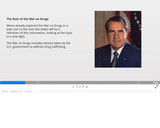
War on Drugs Slideshow
- Subject:
- Career and Technical Education
- Criminal Justice
- Material Type:
- Interactive
- Provider:
- Michigan Virtual
- Date Added:
- 07/29/2019

War on Drugs Slideshow

Just Deserts Slideshow

Mass Incarceration Video

Crime Deterrents Notecards

Slideshow on Types of Shaming
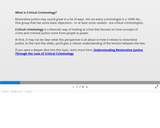
"What is Critical Criminology?" Slideshow
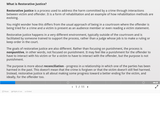
"What is Restorative Justice?" Slideshow

Restorative Justice Notecards
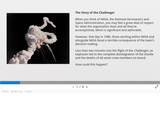
Case study slideshow on the Challenger Disaster

Bizzare Laws Slideshow
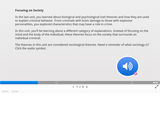
Focusing on Society Slideshow
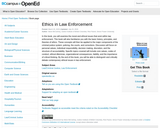
In this book, you will examine the moral and ethical issues that exist within law enforcement. This book will also familiarize you with the basic history, principles, and theories of ethics. These concepts will then be applied to the major components of the criminal justice system: policing, the courts, and corrections. Discussion will focus on personal values, individual responsibility, decision making, discretion, and the structure of accountability. Specific topics covered will include core values, codes of conduct, ethical dilemmas, organizational consequences, liability, and the importance of critical thinking. By the end of this book, you will be able to distinguish and critically debate contemporary ethical issues in law enforcement.

In this book, you will examine the moral and ethical issues that exist within law enforcement. This book will also familiarize you with the basic history, principles, and theories of ethics. These concepts will then be applied to the major components of the criminal justice system: policing, the courts, and corrections. Discussion will focus on personal values, individual responsibility, decision making, discretion, and the structure of accountability. Specific topics covered will include core values, codes of conduct, ethical dilemmas, organizational consequences, liability, and the importance of critical thinking. By the end of this book, you will be able to distinguish and critically debate contemporary ethical issues in law enforcement.

Introduction to Criminal Investigation, Processes, Practices, and Thinking is a teaching text designed to assist the student in developing their own structured mental map of processes, practices, and thinking to conduct criminal investigations.
Delineating criminal investigation into operational descriptors of tactical-response and strategic response while using illustrations of task-skills and thinking-skills, the reader is guided into structured thinking practices. Using the graphic tools of a “Response Transition Matrix”, an “Investigative Funnel”, and the “STAIR Tool”, the reader is shown how to form their own mental map of investigative thinking that can later be articulated in support of forming their reasonable grounds to believe.
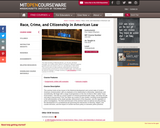
This seminar looks at key issues in the historical development and current state of modern American criminal justice, with an emphasis on its relationship to citizenship, nationhood, and race/ethnicity. We begin with a range of perspectives on the rise of what is often called "mass incarceration": how did our current system of criminal punishment take shape, and what role did race play in that process? Part Two takes up a series of case studies, including racial disparities in the administration of the death penalty, enforcement of the drug laws, and the regulation of police investigations. The third and final part of the seminar looks at national security policing: the development of a constitutional law governing the intersection of ethnicity, religion, and counter-terrorism, and the impact of counter-terrorism policy on domestic police practices.

Test

Test

Test

Labeling Theory Video

Testing Videos